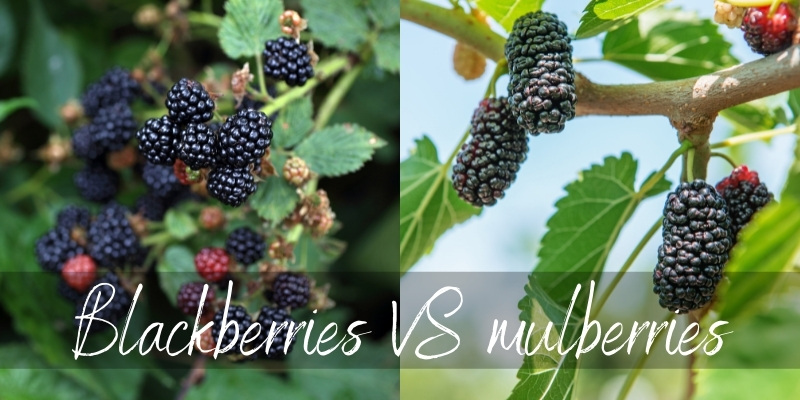The Battle of Berries: Mulberry vs. Blackberry
When it comes to berries, two delicious contenders stand out: mulberries and blackberries. In this article, we will explore the unique characteristics, flavors, nutritional values, culinary uses, and growing tips for both mulberries and blackberries. Let’s dive into the battle of these delectable berries and discover which one comes out on top!
Mulberry – A Sweet and Nutritious Delight

Historical Background
Mulberries have a rich history that dates back centuries. These berries have been cultivated in various parts of the world, including Asia, Europe, and North America. They were highly valued for their sweet taste and versatility in culinary preparations.
Mulberry Varieties
Mulberries come in different varieties, each with its unique characteristics. Some popular mulberry varieties include the White Mulberry, Black Mulberry, and Red Mulberry. The White Mulberry is known for its sweet flavor, while the Black Mulberry offers a more intense and complex taste. The Red Mulberry, on the other hand, has a slightly tart flavor. These varieties provide a range of options for mulberry enthusiasts.
Flavor Profile
Mulberries have a delightful combination of sweetness and tartness. They are often described as having a rich, juicy, and slightly tangy flavor. The texture of mulberries is soft and succulent, with a satisfying chewiness. When compared to other berries, mulberries stand out with their unique taste and texture.
Nutritional Value
Mulberries are not only delicious but also packed with essential nutrients. They are a good source of vitamins, including vitamin C, vitamin K, and several B vitamins. Mulberries are also rich in antioxidants, such as anthocyanins and resveratrol, which have been linked to various health benefits, including improved heart health and reduced inflammation.
Culinary Uses
Mulberries can be used in a variety of culinary creations. They can be enjoyed fresh as a snack or incorporated into dishes like salads, smoothies, and yogurt bowls. Mulberries also make a wonderful addition to baked goods, jams, and desserts. Their sweet and tangy flavor adds a delightful twist to any recipe.
Growing and Harvesting
If you’re interested in growing your mulberries, it’s important to choose the right variety for your climate. Mulberry trees or bushes thrive in well-drained soil and require full sun exposure. They can be grown from seeds, cuttings, or purchased as young plants. Harvesting mulberries is usually done in late spring or early summer when the berries are ripe and easily detach from the tree.
Blackberry – Nature’s Tangy Jewel
Historical Background
Blackberries have a long history and have been enjoyed for centuries. They are native to Europe, but now they are cultivated in many parts of the world. Blackberries have been highly valued in different cultures for their tangy flavor and versatility in culinary applications.
Blackberry Varieties
Blackberries come in various cultivars, each with its unique characteristics. Some popular blackberry varieties include the Marionberry, Boysenberry, and Thornless Blackberry. The Marionberry is known for its rich, sweet flavor, while the Boysenberry offers a delightful combination of sweetness and tartness. Thornless Blackberries, as the name suggests, are easier to handle during harvesting and have a milder flavor. These varieties provide options for different taste preferences.
Flavor Profile
Blackberries have a distinct tangy and slightly sweet flavor. They are known for their juicy and succulent texture, with a delicate balance of sweetness and tartness. The seeds in blackberries add a subtle crunch, enhancing the overall eating experience. Compared to other berries, blackberries have a unique flavor profile that makes them stand out in both sweet and savory dishes.
Nutritional Value
Blackberries are not only delicious but also packed with essential nutrients. They are a great source of dietary fiber, vitamin C, vitamin K, and manganese. Blackberries are also rich in antioxidants, such as anthocyanins, which contribute to their deep purple color and provide potential health benefits, including improved brain function and reduced risk of chronic diseases.
Culinary Uses
Blackberries are incredibly versatile in the kitchen. They can be enjoyed fresh as a snack or used in a wide range of culinary creations. Blackberries are commonly used in desserts like pies, tarts, and cobblers, where their natural sweetness shines. They also pair well with savory dishes, such as salads, sauces, and marinades, adding a tangy and vibrant element to the overall flavor profile.
Growing and Harvesting
If you’re interested in growing your blackberries, it’s important to choose the right variety and provide the ideal growing conditions. Blackberries thrive in well-drained soil with full sun exposure. They can be grown as erect bushes or trained to grow on trellises. Blackberries are typically harvested in the summer when they are plump, shiny, and easily detach from the plant.
Frequently Asked Questions about Blackberries
Here are some common questions about blackberries:
Q: How should blackberries be stored?
A: Blackberries are delicate and should be stored in the refrigerator, preferably in a single layer to prevent crushing. They are best consumed within a few days of purchase.
Q: What pests should I watch out for when growing blackberries?
A: Common pests that may affect blackberries include aphids, spider mites, and fruit flies. Regular monitoring and appropriate pest control measures can help protect your plants.
Q: Are there any medicinal uses for blackberries?
A: Blackberries have been traditionally used for their potential health benefits, such as improving digestion and boosting the immune system. However, it’s important to consult with a healthcare professional before using blackberries for medicinal purposes.
Conclusion
Both mulberries and blackberries offer unique flavors, nutritional benefits, and culinary versatility. Whether you prefer the sweet and juicy taste of mulberries or the tangy delight of blackberries, these berries are sure to satisfy your taste buds. Incorporate them into your recipes, enjoy them fresh, or explore new ways to experience their deliciousness. Embrace the battle of berries and let your palate be the ultimate judge!




